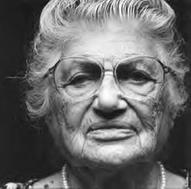Hayastan Maghakian Terzian

Hayastan Maghakian Terzian
Born 1903, Pazmashen, Kharpert (Harpoot)
My brother-in-law was American Consul Davis' body guard in Mezre and the consul himself saved my father's life. There was a Turkish gendarme by the name of Shadhe who wanted to kill my father.
Consul Davis came all the way to our door in Pazmashen. My father was hiding in the back, in the wood shed. He came on his horse and took my father back with him to the consulate.
When the deportations began, I went to Mezre to say goodbye to my father. He cried. The consul saw him and told me to stay. Later, my mother escaped from the deportation and also came to the consulate. We were in the American consulate during the deportations. Consul Davis saved us. Everybody else, my sisters, my maternal aunt—all of them, all of them—were deported. Our whole village was wiped out.
We lived in the consulate until 1922. On September 7, 1922, our family left Kharpert along with 250 Armenian orphans on horses and wagons. My father was asked by the Near East Relief to oversee the transportation of these orphans from Kharpert to Aleppo.
From Aleppo we went to Beirut, then to Marseille and then by ship we came to Providence, Rhode Island.
Born 1903, Pazmashen, Kharpert (Harpoot)
My brother-in-law was American Consul Davis' body guard in Mezre and the consul himself saved my father's life. There was a Turkish gendarme by the name of Shadhe who wanted to kill my father.
Consul Davis came all the way to our door in Pazmashen. My father was hiding in the back, in the wood shed. He came on his horse and took my father back with him to the consulate.
When the deportations began, I went to Mezre to say goodbye to my father. He cried. The consul saw him and told me to stay. Later, my mother escaped from the deportation and also came to the consulate. We were in the American consulate during the deportations. Consul Davis saved us. Everybody else, my sisters, my maternal aunt—all of them, all of them—were deported. Our whole village was wiped out.
We lived in the consulate until 1922. On September 7, 1922, our family left Kharpert along with 250 Armenian orphans on horses and wagons. My father was asked by the Near East Relief to oversee the transportation of these orphans from Kharpert to Aleppo.
From Aleppo we went to Beirut, then to Marseille and then by ship we came to Providence, Rhode Island.
